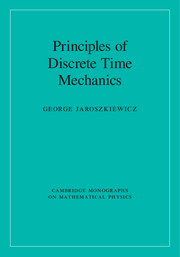Book contents
- Frontmatter
- Contents
- Preface
- Part I Discrete time concepts
- 1 Introduction
- 2 The physics of discreteness
- 3 The road to calculus
- 4 Temporal discretization
- 5 Discrete time dynamics architecture
- 6 Some models
- 7 Classical cellular automata
- Part II Classical discrete time mechanics
- Part III Discrete time quantum mechanics
- Part IV Discrete time classical field theory
- Part V Discrete time quantum field theory
- Part VI Further developments
- Appendix A Coherent states
- Appendix B The time-dependent oscillator
- Appendix C Quaternions
- Appendix D Quantum registers
- References
- Index
3 - The road to calculus
from Part I - Discrete time concepts
Published online by Cambridge University Press: 05 May 2014
- Frontmatter
- Contents
- Preface
- Part I Discrete time concepts
- 1 Introduction
- 2 The physics of discreteness
- 3 The road to calculus
- 4 Temporal discretization
- 5 Discrete time dynamics architecture
- 6 Some models
- 7 Classical cellular automata
- Part II Classical discrete time mechanics
- Part III Discrete time quantum mechanics
- Part IV Discrete time classical field theory
- Part V Discrete time quantum field theory
- Part VI Further developments
- Appendix A Coherent states
- Appendix B The time-dependent oscillator
- Appendix C Quaternions
- Appendix D Quantum registers
- References
- Index
Summary
In this chapter we discuss the infinitesimal calculus and its discrete analogues.
The origins of calculus
Before the work of Newton and Leibniz established differential and integral calculus, the term calculus referred to any general body of mathematics. Afterwards, it became reserved almost exclusively for what should more properly be called the infinitesimal calculus, or the mathematics of infinitesimals. Infinitesimals are non-zero numbers that are smaller in magnitude than any finite number, the latter being numbers that can be assigned as magnitudes of physically measurable quantities.
Although all mathematical concepts are abstractions, infinitesimals are usually regarded as somehow ‘more abstract’ than finite numbers. The reason for this anomaly is that, whilst we use ordinary integers such as one, two, etc. for counting and fractions such as a half, one third, etc. for dividing up objects such as cakes, we do not encounter situations calling for explicit use of infinitesimals. In those circumstances where we encounter objects that appear very small on ordinary scales, such as atoms in chemistry and angles of optical resolution in astronomy, we use devices such as microscopes and telescopes to magnify them, so that they appear to be of finite size.
Infinitesimals are perhaps best regarded in terms of processes; that is, their value lies in what is done with them rather than with their individual qualities.
- Type
- Chapter
- Information
- Principles of Discrete Time Mechanics , pp. 32 - 45Publisher: Cambridge University PressPrint publication year: 2014

